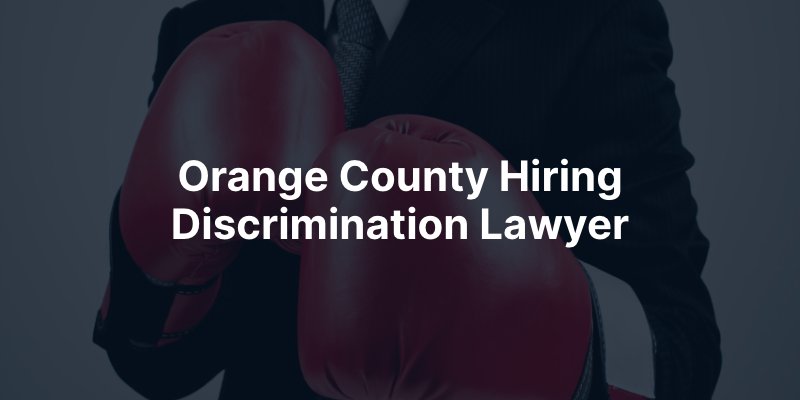If you believe you have faced discrimination during the hiring process, contact Aegis Law Firm. Our Orange County Hiring Discrimination Lawyer is dedicated to ensuring our clients have a strong voice in seeking justice. Call (949) 379-6250 or message us online to arrange a free consultation today.

A Hiring Discrimination Lawyer serves as a crucial ally for individuals navigating unjust hiring practices. With a deep understanding of anti-discrimination laws, they conduct thorough investigations to gather compelling evidence of bias during the hiring process. With their knowledge and experience, they will advocate for you, articulating and defending your rights to ensure a fair and equal opportunity. Whether through negotiation or litigation, a Hiring Discrimination Lawyer will work tirelessly to hold the employer accountable. In some cases, negotiations may lead to a fair settlement that addresses the concerns raised. However, when necessary, taking legal action will send a powerful message that such behavior will not be tolerated.
Some common indicators of hiring discrimination include:
Pre-Employment Questions
Companies should not ask questions that reveal an applicant’s protected characteristics, such as race, sex, national origin, disability, age, religion, color, or ancestry. Additionally, any questions related to disabilities should only be asked once a job offer is extended.
Consistent Rejections
If people from certain groups are consistently turned down despite being qualified.
Limited Diversity
A lack of diversity in the workforce could signal discriminatory practices in hiring.
Changes in Requirements
Abrupt changes in job requirements after diverse candidates have applied may suggest an attempt to exclude certain groups.
Unfair Interviewing
If interview questions focus on personal characteristics rather than job-related skills.
Subjective Decisions
Relying too much on personal opinions rather than objective criteria may allow biases to influence hiring choices.
Insensitive Behavior
Discriminatory language or behavior during interviews is a clear sign of potential hiring discrimination.
Lack of Transparency
If the hiring process lacks transparency or opportunities for feedback, it might be concealing discriminatory practices.
Job Advertisements
Using language like “women encouraged to apply” or “ideal for recent college graduates” in job ads is considered unethical, as it may discourage certain individuals from applying based on their gender or age.
Recruitment Practices
Relying solely on word-of-mouth recruitment from a predominantly white workforce could be deemed illegal if it results in a lack of diversity among new hires.
Employers are not legally allowed to discriminate during the hiring process. Several state and federal laws protect individuals from hiring discrimination based on various characteristics. Those include:
Title VII of the Civil Rights Act of 1964
This landmark legislation prohibits discrimination based on race, color, religion, sex, or national origin. Title VII covers all aspects of employment, including hiring.
Age Discrimination in Employment Act (ADEA)
Enacted in 1967, the ADEA prohibits discrimination against individuals aged 40 or older in hiring, promotion, discharge, compensation, or terms, conditions, and privileges of employment.
Americans with Disabilities Act (ADA)
Enacted in 1990, the ADA prohibits discrimination against individuals with disabilities, ensuring they have equal opportunities in employment, including the hiring process.
While not specifically addressing hiring discrimination, the EPA requires equal pay for equal work regardless of gender, which indirectly impacts the hiring process by promoting fairness in compensation.
Genetic Information Nondiscrimination Act (GINA)
Enacted in 2008, GINA prohibits discrimination based on genetic information in hiring, promoting equal employment opportunities.
California Fair Employment and Housing Act (FEHA)
Extends protections beyond federal laws, covering additional categories like marital status, sexual orientation, gender identity, and more.
California Labor Code Section 1102.5
Protects employees from retaliation for reporting violations or refusing to participate in unlawful activities, which includes discriminatory hiring practices.
Similar to the federal EPA, it prohibits wage discrimination based on gender, race, and ethnicity for substantially similar work.
These laws ensure that employers make hiring decisions based on merit, qualifications, and job-related criteria rather than an individual’s characteristics or background.
Hiring discrimination attorneys employ various strategies to prove illegal hiring practices. Here are key methods they may use:
The next step would be to file a complaint with the relevant agency, such as the Equal Employment Opportunity Commission (EEOC) or California’s Civil Rights Department. Your attorney can guide you through the complaint process, and once you are issued a “right-to-sue” notice from the applicable agency, you will have the ability to file a lawsuit.
If you or a loved one has experienced hiring discrimination, contact an Aegis Law Firm Orange County wrongful termination attorney. We offer free consultations, and together, we can work towards a fair and equitable resolution.